Mobile applications appear simple for their users. However, behind every user-friendly interface is a complex and intricate backend infrastructure that can be daunting to build and maintain. When deadlines are pressing, businesses can’t afford to spend months developing, deploying, and managing strong back ends for their mobile applications.
This is where mobile backend as a service, or MBaaS, comes into play. It addresses the critical challenge of managing as well as scaling and maintaining mobile app infrastructure. In this overview, you’ll learn how your business can benefit from an MBaaS platform, what alternatives there are, and what platforms can help you efficiently build, deploy, and scale your mobile solutions.
This article will be useful for business founders, product owners, and CTOs who are looking for a cost-efficient and fast way to build their mobile applications.
Contents:
The role of MBaaS in mobile app backend development
Mobile backend as a service (MBaaS) solutions provide predesigned and ready-to-use backend functionality via a customizable software development kit (SDK) or application programming interface (API).
Typically, an MBaaS platform includes the infrastructure and features of a mobile server, such as data storage, geolocation, authentication, push notifications, and user management. Using an MBaaS platform, a team of engineers can easily enable desired features in a mobile application, bypassing lengthy custom development.
MBaaS platforms simplify server-side development. When you build the server side of your app from scratch, you need to integrate and manage several proprietary systems with various data formats and large volumes of data. An MBaaS platform does it all for you.
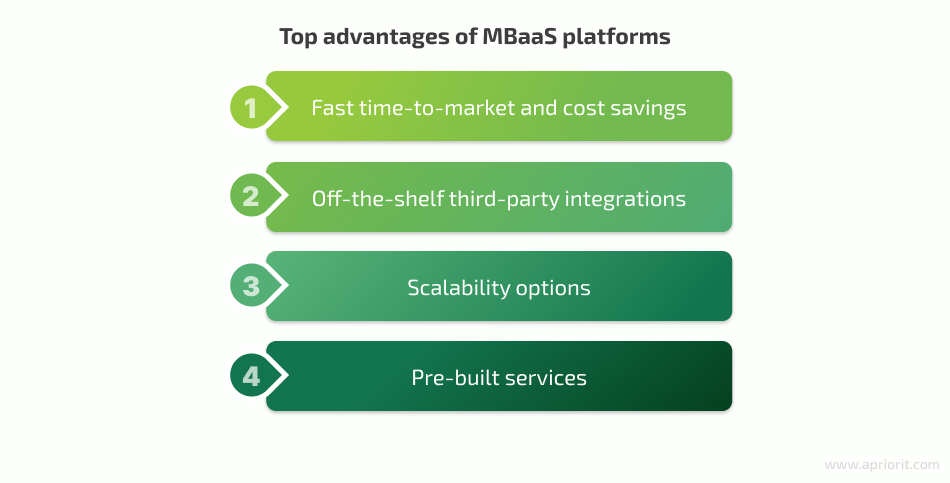
The main advantages of using MBaaS platforms for backend app development are:
- Fast time to market and cost-efficiency. MBaaS platforms provide predesigned infrastructure and features commonly found on mobile servers, such as data storage, geolocation, authentication, push notifications, and user management. Using an MBaaS platform can save developers weeks or even months of effort by enabling them to quickly create applications with a great number of features.
- Scalability options. MBaaS platforms are designed to handle various levels of application scalability. Businesses can scale their apps to accommodate increasing user demands without significant infrastructure changes or investments.
- Off-the-shelf third-party integrations. MBaaS platforms allow easy out-of-the-box integrations with the most popular third-party mobile payment services, social media authentication, email, chat and messaging, and even high-end AI and ML services.
- Pre-built services. MBaaS platforms offer a suite of pre-built services, such as user management, persistent data storage, push notifications, geolocation services, and API management. These services simplify development.
By using an MBaaS platform for your back end, you can focus on mission-critical design and interface development, thus providing more value to your customers.
However, choosing an MBaaS-based back end may come with challenges. Let’s look at them in detail.
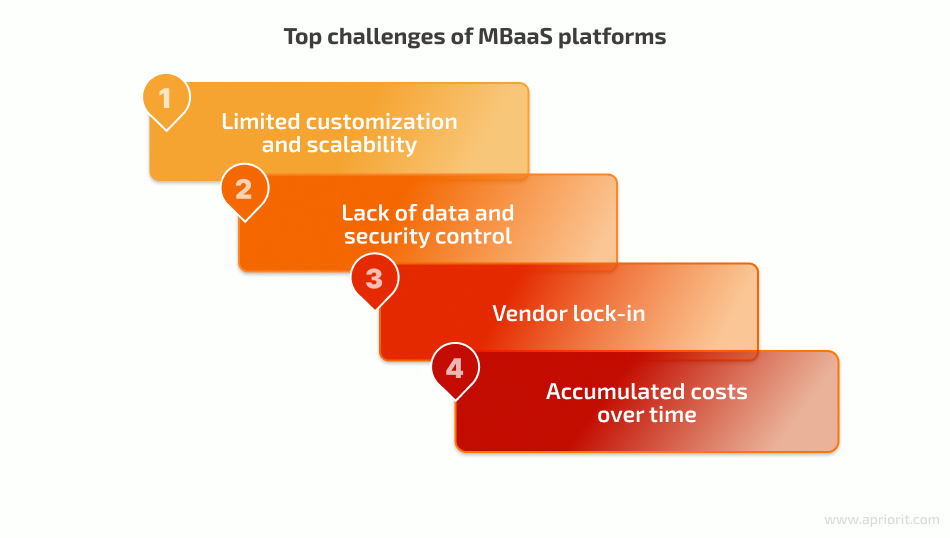
- Limited customization and scalability. While top MBaaS platforms offer convenience, they have limits in terms of customization and scalability. If your product is highly unique, has specific requirements, or grows rapidly, MBaaS will likely fall short.
- Vendor lock-in. Transitioning to another solution can be complex and costly due to dependence on the provider’s infrastructure and services.
- Lack of data and security control. You need to entrust an MBaaS provider with your critical data, and their security measures are out of your control, so it’s vital to choose a reliable partner.
- Accumulated costs over time. While MBaaS can lower initial development costs, long-term costs associated with ongoing use and scalability can add up significantly.
Apart from MBaaS, there are also other backend options you can choose from:
- Custom back end
- SaaS app development platforms
The main difference between these options is how many resources they require and how customizable they are. Let’s see what each has to offer.
Need a reliable back end?
Apriorit specialists can build a robust and secure back end tailored to your business’s unique needs.
Alternative ways to build a mobile back end
There are other ways to approach mobile backend development apart from using an MBaaS platform. There is no one-size-fits-all solution, as each strategy has its own advantages and tradeoffs. To give you a range of options, we’ll briefly talk about custom and SaaS-based backend development.
Сustom back end
A custom mobile back end is built from scratch and tailored to the application’s specific business requirements. To create a custom back end, you need a team of developers who will configure your servers, databases, APIs, and services to support your app’s functionality.
Typically, businesses choose custom backend development for complex applications with unique requirements or when organizations need full control and customization over their backend infrastructure.
The Apriorit team has experience building custom backend infrastructure for large products in healthcare, logistics, artificial intelligence (AI), and other domains that require a complex approach and a high level of customization and security.
Like any solution, custom back ends come with their own advantages and tradeoffs.
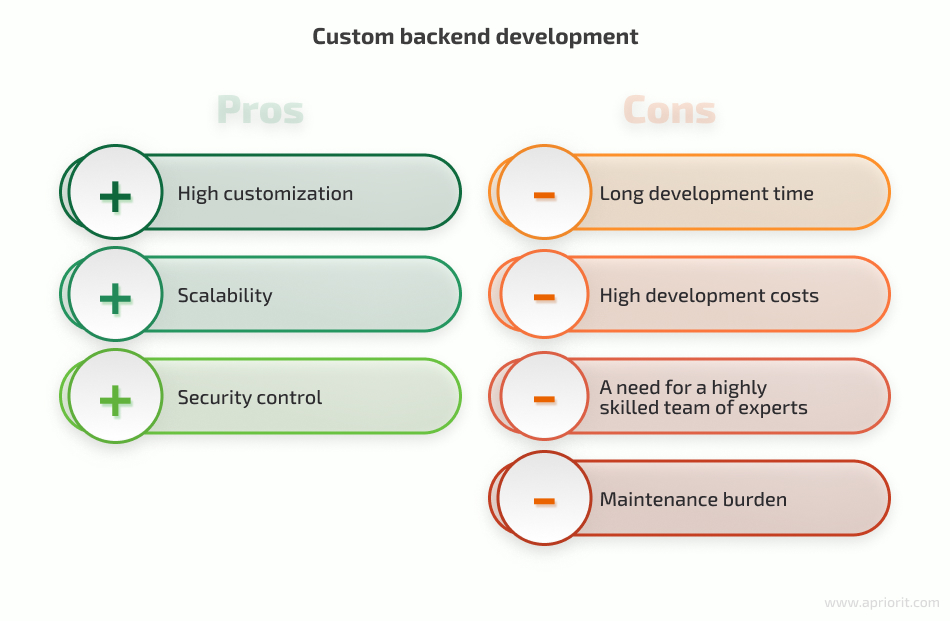
Getting a mobile app up and running quickly is the absolute priority of most modern businesses. However, developing mobile server infrastructure from scratch is hard and time-consuming, and doing so will likely cause a delay in launching your mobile app. Moreover, not all companies can afford such expensive development, so they seek more cost-efficient and time-saving alternatives like SaaS platforms.
SaaS app development platforms
The alternative to custom development is using SaaS app development platforms that use low-code technologies to build applications. They provide visual development environments, pre-built components, and templates for creating mobile apps with minimal coding.
Primarily, such platforms focus on front end and app logic development, but some platforms offer backend services and integration options including databases, authentication, and APIs.
Let’s look at the pros and cons of using SaaS platforms for building apps.
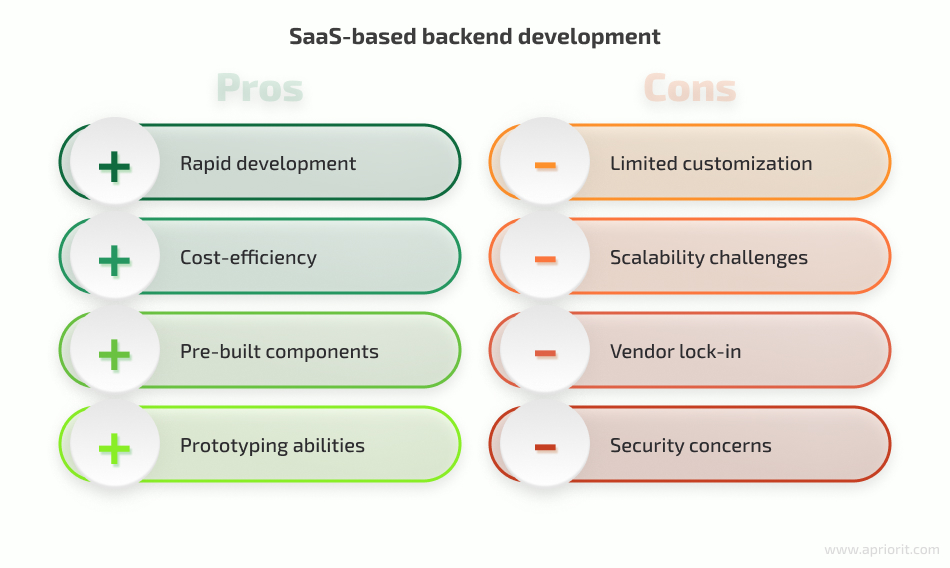
SaaS app development platforms are perfect for businesses who want to launch a simple app in the shortest terms, but they aren’t suitable for products with complex requirements and strong security demands.
In the following table, we compare the main approaches to developing mobile back ends so you can get a clear understanding of the pros, cons, and ideal use cases for each approach.
| MBaaS platforms | Custom backend development | SaaS app development platforms | |
|---|---|---|---|
| Pros | – Accelerated development – Reduced development costs – Scalability options – Cross-platform compatibility | – High customization – Scalability – Security control | – Rapid development – Cost-efficiency – Pre-built components – Prototyping abilities |
| Cons | – Limited customization – Vendor lock-in – Lack of data control – Scalability limits | – Long development time – High development costs – Need for a highly skilled team – Maintenance burden | – Limited customization – Scalability challenges – Vendor lock-in – Security concerns |
| Typical use cases | – Accelerated development for various apps – Prototyping and MVP development – Startups and small to midsize businesses – Cross-platform mobile apps | – Complex applications – Unique requirements – Specific data security requirements | – Simple apps with minimal customization – Proof of concept apps – Projects with limited development resources |
As you can see, the perfect middle between custom and SaaS-powered development is using an MBaaS platform. It will allow you to accelerate development while giving you complete freedom in frontend development.
Choosing a mobile backend as a service provider isn’t easy, as there are many factors to consider. But before we talk about them, let’s look at the most popular and trusted MBaaS platforms you can consider.
Top 7 MBaaS platforms and tools
In this section, we briefly describe top MBaaS providers and tools with a focus on their key features and the types of projects these tools are suitable for.
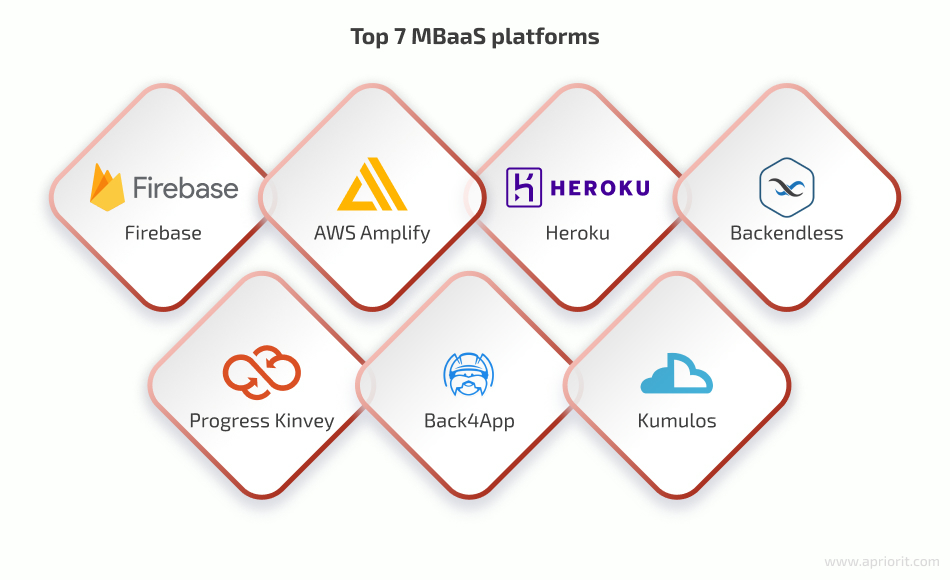
Firebase
Firebase is one of the most popular serverless development platforms for Android, iOS, and web applications. It offers a wide range of tools and services that simplify backend development for mobile and web applications.
Key features include:
- Realtime NoSQL database for data storage and synchronization
- Secure authentication system that supports email/password, social media logins (Google, Facebook), and custom authentication methods
- Cloud-based Firebase Storage for user-generated content like images, videos, and files
- Firebase Cloud Messaging for sending notifications, messages, or updates to mobile and web clients
- Firebase Crashlytics for tracking, reporting, and prioritizing app crashes and issues across platforms
Firebase consists of many different servers that can be used independently. If you don’t need the platform’s full functionality, it’s possible to use only some of the features without opting for a full suite.
Note that complex, large-scale apps may find Firebase query capabilities limited. Firebase’s pricing model makes it an expensive option for projects such as retail apps that involve a high volume of database transactions.
Suitable for: small to midsize projects
AWS Amplify
AWS Amplify is a versatile collection of libraries, user interface components, and a command-line interface (CLI). Amplify is favored by teams at HyperTrack, Orangetheory, and Branch.
Key features include:
- Built-in user management
- Framework for sending push notifications to mobile and web clients
- Multiple data storage options
- Support of AI/ML capabilities like image recognition, text interpretation, and speech transcription in iOS and Android applications
AWS Amplify is rather complex and features a steep learning curve. This can be a hurdle for companies looking to reduce their time to market.
Suitable for: large-scale projects with strict quality and safety requirements rather than startup-level projects
Heroku
Heroku is a cloud platform that provides a wide range of services for hosting, deploying, and scaling web applications and mobile back ends. While not traditionally categorized as an MBaaS platform, it offers many features and services that you can use to build and host the back end for your mobile app.
Key features include:
- Server-side code and API deployment with various programming languages
- Integrated database providers like Heroku Postgres and Heroku Redis for caching
- Secure authentication with third-party identity providers
- Automatic scaling and load balancing for handling varying traffic levels
Heroku is user-friendly, supports multiple programming languages, and offers scalability options. However, the costs can add up, especially with numerous add-ons and database services.
Suitable for: small to midsize projects or MVPs
Backendless
Backendless is one of the best MBaaS platforms, competing with top players in the market. It boasts a solid client base, including SMBs and Fortune 500 companies like Accenture, Dell, and Capgemini. Backendless supports a wide range of client languages including Java, Swift, Objective-C, JavaScript, Flutter, and .NET.
Its feature set includes:
- Secure user authentication, registration, and management
- Geospatial data storage and queries
- Real-time messaging and chat functionality
- Cloud-based file storage and management
- Scalable push notification delivery for engaging user experiences
Backendless also offers specialized versions for large enterprises, such as Backendless Pro and Managed Backendless. As of the time of writing, the latest version of Backendless (7.0.4.8) also features a UI builder, multi-framework development, and a transaction API.
Suitable for: a wide range of projects, from small startups to large enterprises; particularly useful for applications requiring geolocation and real-time messaging
Progress Kinvey
Progress Kinvey is an enterprise-grade MBaaS solution designed to streamline the development and deployment of iOS, Android, web, and progressive web apps. It’s used by companies including Schneider Electric and VMware. Key features include:
- Push notifications
- User authentication and management
- Internet of Things data management
- Specialized microservices for industries like healthcare, insurance, and manufacturing
Progress Kinvey distinguishes itself with its differentiated pricing models, making it cost-effective for individual developers, small and midsize businesses, and large corporations. Extensive technical documentation and a large knowledge base ensure accessibility for developers of varying experience levels.
Suitable for: businesses of varying sizes that require features like push notifications, IoT data management, and industry-specific microservices
Back4App
Back4App is an MBaaS platform offering SDKs for Swift, Android Studio, JavaScript, React Native, GraphQL, and other common development environments. Back4App relies heavily on Parse — one of the most popular platforms for backend development.
Back4App’s mobile server-side development toolbox includes:
- Push notifications
- Automated emails
- Social login
- A spreadsheet database for easy creation, updating, and syncing of data
- A specialized CLI tool for easy migration from Parse to Back4App
Back4App enables you to choose between shared and dedicated software hosting.
Suitable for: various mobile app projects, from MVPs to enterprise-grade applications
Kumulos
Kumulos is a robust platform known for mobile application performance management.
It offers:
- Crash reports and diagnostics
- App store optimization
- SDKs for major environments
Kumulos is highly scalable, with a simple drag-and-drop interface and the ability to collect and use your own data for optimizing performance, creating personalized user experiences, and improving your app. It also offers specialized MBaaS infrastructure for enterprises with specific requirements, such as dedicated servers, custom security measures, scalability options, and custom API integrations.
Suitable for: businesses that need robust app performance management and analytics along with mobile server-side development capabilities
How to choose an MBaaS provider
The choice of MBaaS provider impacts your product significantly, as you’ll use third-party infrastructure for your back end. Your product will Its level of security, reliability, and ease of integration will become your product’s qualities; that’s why it’s important to choose a mobile backend as a service platform that will be reliable and convenient for years ahead.

Let’s look at the main factors you need to account for when choosing an MBaaS provider for your mobile application.
Data security and privacy
Your MBaaS platform should provide secure storage for server-side code, files, and databases in the cloud. All data should be encrypted using industry-standard protocols like TLS/SSL for communication and AES encryption for stored data.
Ensure your MBaaS platform offers role-based access control for users and applications and supports strong authentication methods like multi-factor authentication and single sign-on, such as OAuth 2.0 or OpenID Connect, so that only authorized users can access your platform and data.
If your application deals with sensitive data, make sure that the MBaaS provider offers data segmentation and isolation so you can keep your data separate and protected based on its sensitivity. You should also be able to back up your data to protect against data loss due to accidental deletion, corruption, or cyberattacks.
We also recommend paying extra attention to compliance with industry-standard security requirements and regulations like SOC 2, HIPAA, and the GDPR.
Finally, a very important aspect of using an MBaaS solution from the data security perspective is the provider’s terms of service and data ownership policies. Make sure you have full control and ownership of your data, even if it’s stored and partially managed by your provider.
Searching for a reliable cybersecurity partner?
Apriorit specialists can build a bullet-proof cybersecurity strategy and protect your product from most threats.
Database architecture and performance
Assessing the database capabilities of an MBaaS provider is crucial to ensuring that it can meet your mobile app’s scalability and performance requirements.
Pay attention to the types of databases your MBaaS works with. Common types include relational and non-relational databases, or a mix of both. The choice depends on your app’s data structure and requirements.
Check how scalable your MBaaS infrastructure is. Your backend as a service provider should offer horizontal scalability so you can add more servers or nodes to handle the growing amount of data and users as your application gains traction.
API integrations
Check what APIs are offered to you out-of-the-box by your MBaaS provider. This determines the ease with which your mobile app will be able to connect to third-party integrations, which is crucial for services like push notifications, mobile payments, and geolocation services.
Often, backend as a service providers offer API marketplaces or catalogs with a wide range of APIs for cloud services and third-party integrations. Review them and make sure you have everything you need. If not, check if your MBaaS provider offers custom API support in case you need to develop unique backend functionality or connect to proprietary systems. Your provider should offer clear documentation, code samples, and developer resources to facilitate integration.
Migration possibilities
The ability to migrate your app and its data to another platform allows you to avoid vendor lock-in and is important for your product’s long-term viability.
The best mobile BaaS providers should offer convenient data portability, meaning that you can easily export your app’s data from their platform in a standard format like JSON or CSV to then upload it to another back end. Your MBaaS provider should have comprehensive documentation that explains the data exporting process.
A good data migration policy will allow you to reduce transition costs, avoid data loss during the transition, and maintain control over your data, even if it’s managed on your provider’s platform.
Cost and pricing models
Your provider’s pricing policies will impact your project’s budget and long-term sustainability. That’s why it’s important to assess costs correctly and make sure your vendor provides clear and transparent pricing information.
Evaluate pricing tiers or plans; usually, they’ll vary based on the volume of data storage, API usage, user volume, and available features. Some vendors charge based on the amount of data stored, the amount of data transferred, or API calls, while others have fixed monthly or annual subscriptions. When choosing a plan, consider your app’s future growth.
To make sure you don’t go over budget, review the contract terms and search for any hidden and unforeseen costs like data transfer fees, storage costs, premium support costs, or additional services. Ask your vendor about the costs that may apply if your app exceeds the limits of your chosen plan, as they can significantly affect your budget.
In general, MBaaS is cost-efficient at the very beginning, as it allows you to launch your app for a minimal price and as quickly as possible. However, in our experience, large long-term products shift to custom back ends later, as MBaaS costs can add up significantly, especially when functionality and storage requirements are above average.
Technical support and collaboration
Your partnership with an MBaaS provider should be convenient for you, as your product will depend on the provider’s platform. This means that any issues should be resolved quickly.
Evaluate the technical documentation your vendor provides, as its clarity will impact how quickly and efficiently you’ll be able to deploy your back end. Documentation should cover all information you might need during your work with a service.
Search for customer reviews to find out if your potential MBaaS provider has fast and responsive technical support. Evaluate the responsiveness of your provider and their willingness to apply customer feedback to make positive changes to their platform.
How Apriorit can help you in app backend development
At Apriorit, we understand that building a robust and scalable back end for your mobile application is essential for delivering a seamless user experience. Our team of professional developers and experts is here to support you at every stage of the development process, whether you’re doing custom or MBaaS-powered development. What exactly can we help you with?
- Choosing a backend development strategy. Apriorit experts can help you choose the optimal and most cost-efficient strategy for building your app’s back end. If you decide to use an MBaaS platform, we’ll assess different providers based on your business and technical requirements, budget, predicted growth, and interactions to help you determine the best option. We can also integrate your product with an MBaaS platform to optimize your project’s development time and costs.
- Custom backend component development. Even when using an MBaaS platform, certain app functionalities may require custom development. Apriorit can design and build custom backend components or APIs to meet these unique needs, seamlessly integrating them with the back end. We also have experience using various communication platforms to establish efficient and secure communication between frontend and backend parts of mobile applications.
- Implementing additional security measures. Apriorit can assist in improving the security of your back end and ensuring that data handling complies with industry requirements. This is critical to protect sensitive user information and maintain data privacy.
- Migrating data from an MBaaS-based back end to a custom back end. If you ever discover that an MBaaS back end has stopped being sufficient or cost-effective, we can help you migrate your data to a custom back end.
- Custom backend development. We can help you build a robust and secure back end completely from scratch. From database design to API development, we will create a back end that aligns perfectly with your app’s functionality.
At Apriorit, we can adjust our collaboration in any way that’s convenient for you, but no matter what approach you take, you’ll get a secure and reliable back end for your application.
Conclusion
As the speed of delivering mobile applications has become a key success factor, businesses have started seeing mobile backend as a service platforms as extremely useful development tools. The right MBaaS platform enables teams to simplify application development with out-of-the-box functionality so they can focus on client-facing features and delivering value to users.
With MBaaS platforms, you can get your applications to market faster and benefit from the first-mover advantage. However, despite its benefits, the MBaaS-based approach isn’t suitable for every project. When deciding on the right approach for your project, make sure to take into account all of your core requirements and needs when evaluating different options for building your back end, such as custom development, using a SaaS platform, or using MBaaS solutions.
Our Apriorit team can help you choose the most cost-efficient and reasonable approach to developing your mobile application so you can make sure it’s secure and scalable.
Need a custom back end?
Apriorit specialists can expand your mobile app’s functionality and customize your MBaaS-based back end.


